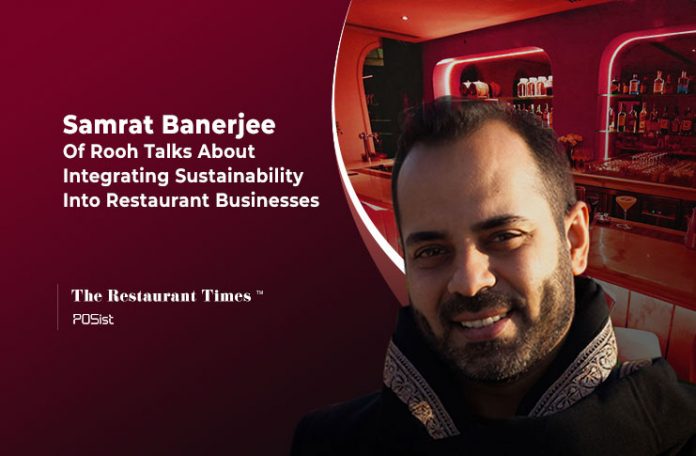Samrat Banerjee, an established F&B entrepreneur, was always passionate about the foodservice industry. After completing his graduation from the Les Roches Swiss Hotel Management School, Switzerland, Samrat aspired to become a chef. He soon realized he was a better cook than a chef. Subsequent to working at various hotels and restaurants in London for five years, he discerned that the service standards in India were far more superior. In 2008, he became an integral part of the opening team of Indian Accent, which was very experimental in nature, both in service and food.
The brainchild of Chef Sujan Sarkar, Rooh – an International Indian Restaurant and Cocktail Bar – was born in 2019, along with Samrat Banerjee. The main promoters of Rooh from San Francisco are Vikram and Anu Bhambri. Located in Delhi’s Ambawatta One Complex, the restaurant operates from a refurbished 150-year old haveli, close to the iconic Qutub Minar
In Conversation With Samrat Banerjee Of Rooh
In an exclusive conversation with The Restaurant Times, Samrat Banerjee talks about different measures leading to a more sustainable environment in the restaurant space.
The Story Behind Rooh
Rooh means ‘spirit’ in Urdu. It was launched after the success of its first outlet in San Francisco, USA, which is an amalgam of traditional and modern Indian cuisine.
Chef Sujan and Samrat wanted to celebrate the country’s rich heritage by creating new food trends, with a quintessential Indian touch to it. Special attention was paid to ensure that Rooh’s interiors were lively. Its architecture has components of art deco and consolidates wide arcs enclosing the Qutb Minar. The decor has the vibrancy of Indian culture, literature and music, as well as the innovative vision of contemporary India. The interior colour palette in pastels and copper tones supplements the underlying theme of the restaurant – a perfect balance and amalgam of new-age and classical sensitivities.
If Rooh, San Francisco has a veiled woman adorning a wall, her counterpart here is a wall map with a woman’s head occupying the entire (what would be) peninsular India (or is it a fan) with branches extending upwards. The seating is another nod to its Frisco sister – With a shade of soft pink, they have a combination of chairs, lending a colonial India look, and leather upholstery.
As for the menu, the idea was to link the gap between Indian and international cuisine. Rooh’s alcoholic cocktails and non-alcoholic cocktails are based on the six Ayurvedic rasas (taste) – sweet, salty, tangy, bitter, sour and astringent.
The visual access to the kitchen and bar makes the entire process from cooking until serving very interactive. Samrat describes the ‘USP’ of Rooh as ‘honest dining’. Rooh delivers and believes in serving quality food. There is no gimmick or pretentious art. Rooh finds a firm foundation in the city within a few months itself!
Question:
About three in four Millennials (74%) and Generation Z consumers (72%) are willing to pay more for sustainable products and services, according to The Nielsen Company. As a part of the hospitality industry, how do you think restaurant businesses should integrate sustainability into their business strategies?
Integrating Sustainability Into Business Strategies
Sustainability is quickly becoming an indispensable part of today’s restaurant industry. Sustainability for restaurants means working in a way that guards, preserves or restores the natural environment, encourages social justice, improves the lives of people and communities and contributes to economic prosperity for shareholders and stakeholders.
Most restaurants have enormous opportunities for cost savings by procuring their raw materials and ingredients locally and avoiding obtaining it from overseas. At Rooh, we procure the majority of the ingredients from different parts of India. The local farms of Mehrauli are a great source of fresh vegetables for them. With a sound network of team members belonging from different parts of the country, it helps us immensely to source ingredients through them from across the country.
At Rooh, we serve essentially progressive Indian cuisine that is simplified for the restaurant-goers of the city.
According to Banerjee, No pretentions is the key to long-term sustainability in any restaurant business. Sustainability issues are forcing restaurants to change the way they do business, but addressing those issues and maintaining corporate social responsibility not only helps the bottom line and offers concrete press, but it also keeps restaurants ambitious and keeps customers coming back. Nowadays, instead of gaining more customers, which was the previous goal, it’s a strategy to keep customers.
National Restaurants Association of India (NRAI) report found that customers can be influenced by a restaurant’s sustainability practices, with about half of customers factoring in a restaurant’s recycling and food donation programs, as well as work to reduce food waste, when choosing where to dine.
At Rooh, our main motto is to keep customers satisfied through a combination of elements. The convenient pricing, quality food delivered and giving importance to the feedback by the customers are an essential part of keeping them satisfied!



















